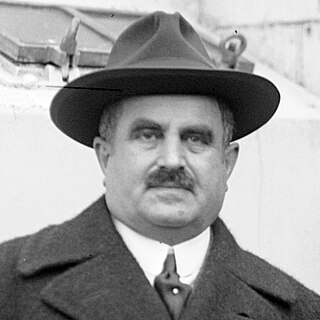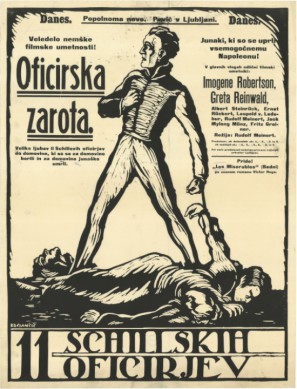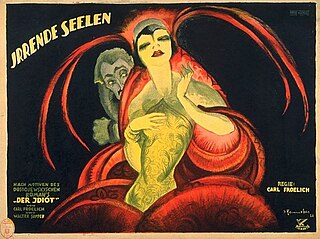Related Research Articles

Asta Sofie Amalie Nielsen was a Danish silent film actress who was one of the most popular leading ladies of the 1910s and one of the first international movie stars. Seventy of Nielsen's 74 films were made in Germany where she was known simply as Die Asta.

Georg Wilhelm Pabst was an Austrian film director and screenwriter. He started as an actor and theater director, before becoming one of the most influential German-language filmmakers during the Weimar Republic.

Der lila Domino is an operetta in three acts composed by Charles Cuvillier. The original German libretto is by Emmerich von Gatti and Bela Jenbach, about a gambling count who falls in love at a masquerade ball with a noblewoman wearing a lilac domino mask.

Robert Wiene was a German film director, screenwriter and producer, active during the silent era. He is widely-known for directing the landmark 1920 film The Cabinet of Dr. Caligari and a succession of other expressionist films. Wiene also directed a variety of other films of varying styles and genres. Following the Nazi rise to power in Germany, Wiene, who was of Jewish descent, fled into exile.

Joyless Street, also titled The Street of Sorrow or The Joyless Street, is a 1925 German silent film directed by Georg Wilhelm Pabst starring Greta Garbo, Asta Nielsen and Werner Krauss. It is based on a novel by Hugo Bettauer and widely considered an expression of New Objectivity in film.

Hocuspocus is a 1953 West German comedy crime film directed by Kurt Hoffmann and starring Curt Goetz, Valerie von Martens and Hans Nielsen. Based on Goetz's own play from 1926 and on the first movie of 1930 of which an English-language version was made at the same time, it was remade in 1966 in color as Hocuspocus.

Paul Davidson was a German film producer.

The Eleven Schill Officers is a 1926 German silent historical film directed by Rudolf Meinert and starring Meinert, Gustav Adolf Semler, Grete Reinwald, and Leopold von Ledebur. The film depicts the failed 1809 uprising of Prussian soldiers led by Ferdinand von Schill against the occupying French during the Napoleonic War. The film received poor reviews from critics, but earned enough at the box office to offset its production costs.

The Vice of Humanity is a 1927 German silent drama film directed by Rudolf Meinert and starring Asta Nielsen, Werner Krauss and Alfred Abel. It premiered at the Marmorhaus in Berlin.
Gregori Mikhailovich Chmara was a Ukrainian-born stage and film actor whose career spanned six decades.

Continental-Kunstfilm GmbH was a short-lived German film production company based in Berlin, formed in February 1912 by Walter Schmidthässler and Max Rittberger. A large number of Continental-Kunstfilm's productions are now probably lost, although some significant films have survived into the 21st century.

I.N.R.I. is a 1923 German silent religious epic film directed by Robert Wiene and starring Gregori Chmara, Henny Porten, and Asta Nielsen. The film is a retelling of the events leading up to the crucifixion of Jesus Christ. It was based on a 1905 novel by Peter Rosegger. It was reissued in 1933 in the United States with an added music track and narration as Crown of Thorns.

Wandering Souls is a 1921 German silent drama film directed by Carl Froelich and starring Asta Nielsen, Alfred Abel, and Walter Janssen. It was based on Fyodor Dostoyevsky's 1869 novel The Idiot. The film was the first of three to be made by Russo Film, a small production company set up by Decla-Bioscop to make literary adaptations. The 123-minute film was shot at the Johannisthal Studios in Berlin. It premiered on 3 March 1921 at the Marmorhaus in Berlin.
The Fallen is a 1926 German silent drama film directed by Rudolf Walther-Fein and Rudolf Dworsky and starring Asta Nielsen, William Dieterle, and Otto Gebühr. It was shot at the EFA Studios in Berlin. The film's sets were designed by the art director Jacek Rotmil. The 109-minute film addressed the issue of alcoholism amongst the German working class.
Roswolsky's Mistress is a 1921 German silent drama film directed by Felix Basch and starring Asta Nielsen, Paul Wegener, and Wilhelm Diegelmann. It was based on a novel by George Froeschel. The film was shot at the Tempelhof Studios in Berlin, with sets designed by art directors Robert Neppach and Jack Winter. According to one estimate, the star Asta Nielsen wore thirty six different costumes during the course of the film.
Willy Zeyn (1876-1946) was a German film director and screenwriter of the silent era. His son Willy Zeyn became a film editor and producer.
The Queen of the Stock Exchange is a 1918 German silent film directed by Edmund Edel and starring Asta Nielsen and Aruth Wartan.
So Ends My Song is a 1919 German silent film directed by Willy Grunwald and starring Asta Nielsen and Marga Köhler.
The Revenge of Count Silvain is a 1920 German silent comedy film directed by Willy Grunwald and starring Asta Nielsen.
The Merry-Go-Round is a 1920 German silent film directed by Richard Oswald and starring Asta Nielsen, Conrad Veidt and Eduard von Winterstein. It was adapted from the 1897 play, La Ronde by Arthur Schnitzler.
References
- ↑ Before Caligari p. 488